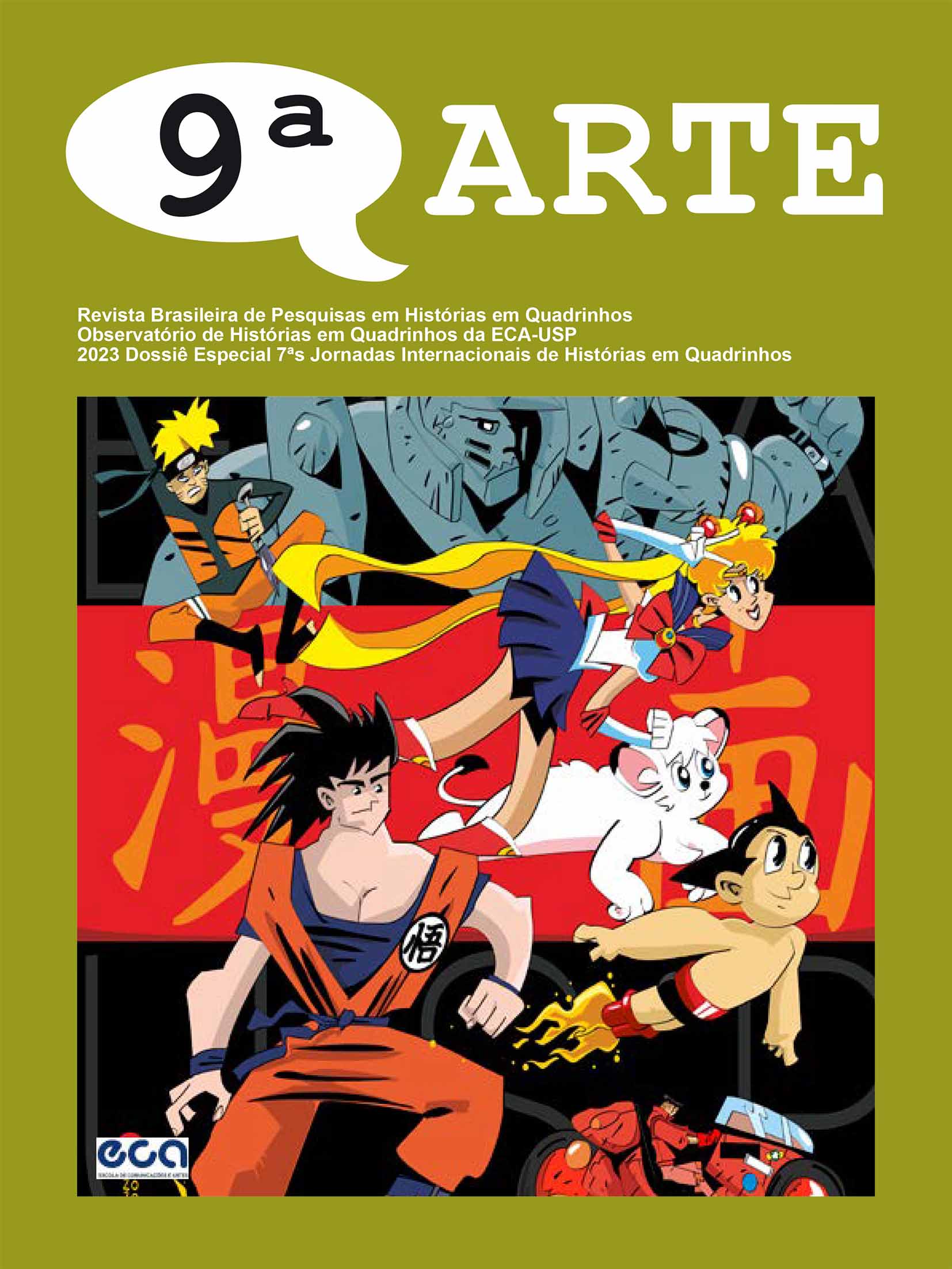Differences between the boys’ love genre in manga and dorama forms through Cherry Magic! (Dossiê 7as Jornadas Internacionais de HQs)
DOI:
https://doi.org/10.11606/2316-9877.Dossie.2023.e217199Keywords:
Boys' love, Manga, Dorama, Cherry Magic!Abstract
Boys’ love is a genre that was born in the manga, went through anime and now is gaining recognition in dorama form. One of the main representatives of the genre in this form in Japan is Cherry magic!. The objective of this project is making a comparative analysis of this story between its comic and TV series versions, because of the recent talks about the fact that live action BL productions are more consonant with a gay reality comparatively with their manga and anime versions. What could be observed by then is that in the manga the protagonist’s aesthetic is much more stereotypically fit in the seme (manly and virile) and uke (delicate and effeminate) narrative than its television version. It is expected that this work can help in obtaining knowledge about the changes the genre is suffering in its recent adaptations in the live action format.
Downloads
References
AMORIM, Lauro Maia. Tradução e adaptação: encruzilhadas da textualidade em Alice no país das maravilhas, de Lewis Carrol, e Kim, de Rudyard Kipling. São Paulo: Editora UNESP, 2005.
AUMONT, Jacques et al. A estética do filme. 9. ed. Campinas: Papirus, 2017.
BAUDINETTE, Thomas. Japanese gay men’s attitudes towards “gay manga” and the problem of genre. East Asian journal of popular culture. v. 3, n. 1, p. 59–72, 2017. Disponível em: https://doi.org/10.1386/eapc.3.1.59_1. Acesso em: 20 maio 2023.
CHERRY MAGIC!, Thirty years of virginity can make you a wizard?!. Square Enix Manga, vol. 1, mar. 2020. E-book.
CHERRY MAGIC!, Thirty years of virginity can make you a wizard?!. Direção: Kazama Hiroki. Japão: TV Tokyo, 2020. Série exibida pela Crunchyroll. Disponível em: https://www.crunchyroll.com/pt-br/series/GDKHZE1GP/cherry-magic-thirty-years-of-virginity-can-make-you-a-wizard. Acesso em: 17 nov. 2023.
ENOMOTO, Yukihiro; HASHIZUME, Koga; KISHIMOTO, Marimi. Thailand's 'boys love' dramas stealing hearts around the world. Nikkei Asia, 2022. Disponível em: https://asia.nikkei.com/Business/Media-Entertainment/Thailand-s-boys-love-dramas-stealing-hearts-around-the-world. Acesso em: 20 abr. 2022.
FUSANOSUKE, Natsume. Where is Tezuka? A theory of manga expression. Tradução por Matthew Young. Mechademia. v. 8, p. 89-107, 2013. Disponível em: https://doi.org/10.5749/mech.8.2013.0089. Acesso em 17 nov. 2023.
GAUDREAULT, André. JOST, François. A narrativa cinematográfica. Brasília: Editora Universidade de Brasília, 2009.
GIL, Antonio Carlos. Métodos e técnicas de pesquisa social. 6. ed. São Paulo: Atlas S.A., 2008.
GROENSTEEN, Thierry. Comics and narration. Jackson: University Press of Mississippi, 2013.
GROENSTEEN, Thierry. O sistema dos quadrinhos. Nova Iguaçu: Marsupial, 2015.
HARTLEY, Barbara. A genealogy of boys love: the gaze of the girl and the bishōnen body in the prewar images of Takabatake Kashō. In: McLELLAND, Mark et al. (ed.). Boys love manga and beyond: history, culture, and community in Japan. Jackson: University Press of Mississippi, 2015.
HUTCHEON, Linda. Uma teoria da adaptação. 2. ed. Florianópolis: Editora UFSC, 2013.
ITO, Kinko. Manga in Japanese history. In: MacWILLIAMS, Mark W. (ed.). Japanese visual culture: explorations in the world of manga and anime. Armonk: M.E. Sharpe, Inc., 2008.
IWABUCHI, Koichi. Recentering globalization: popular culture and Japanese transnationalism. Durham: Duke University Press, 2002.
JIRATTIKORN, Amporn. Between ironic pleasure and exotic nostalgia: audience reception of Thai television dramas among youth in China. Asian journal of communication, v. 31, n. 2, p. 124-143, mar. 2021.
KANAYAMA, Tsutomu; KANAYAMA; Tomoko. Japan. In: COOPER-CHEN, Anne (ed.). Global entertainment media: content, audiences, issues. Mahwah: Lawrence Erlbaum, 2005.
KWON, Jungmin. The past, present, and future of boys love (BL) cultures in East Asia. In: HONG, Seok-Kyeong; JIN, Dal Yong (ed.). Transnational convergence of East Asian pop culture. New York: Routledge, 2021.
McLELLAND, Mark J. Male homosexuality in modern Japan: cultural myths and social realities. Richmond, Surrey: Curzon Press, 2000.
McLELLAND, Mark J. et al. (ed.). Boys love manga and beyond: history, culture, and community in Japan. Jackson: University Press of Mississippi, 2015.
NAGAIKE, Kazumi. Fantasies of cross-dressing: Japanese women write male-male erotica. Leiden/Boston: Brill, 2012.
NAKAMURA, Momoko. Gender, language and ideology: a genealogy of Japanese women's language. Amsterdã/Filadélfia: John Benjamins, 2014.
ŌTA, Tōru. Producing (post-)trendy Japanese TV dramas. In: IWABUCHI, Koichi (ed.). Feeling Asian modernities: transnational consumption of Japanese TV dramas. Hong Kong: Hong Kong University Press, 2004.
STAM, Robert. Teoria e prática da adaptação: da fidelidade à intertextualidade. Ilha do Desterro, n. 51, p. 19-53, jul./dez. 2006. Disponível em: https://doi.org/10.5007/2175-8026.2006n51p19. Acesso em: 4 jun. 2023.
TADAO, Satō. Does film theory exist in Japan? Review of Japanese culture and society, v. 22, p. 14-23, dez./2010. Disponível em: https://www.jstor.org/stable/42800636. Acesso em: 17 nov. 2023.
TORTERMVASANA, Komsan; LEESA-NGUANSUK, Suchit; WORRACHADDEJCHAI, Dusida. Asia falls in love with Thai boys love. Bangkok Post, 2022. Disponível em: https://www.bangkokpost.com/business/2305042/asia-falls-in-love-with-thai-boys-love. Acesso em: 15 maio 2022.
WELKER, James. A brief history of shōnen’ai, yaoi and boys love. In: McLELLAND, Mark et al (ed.). Boys love manga and beyond: history, culture, and community in Japan. Jackson: University Press of Mississippi, 2015.
WILLIAMS, Walter. From samurai to capitalist: male love, men's roles, and the rise of homophobia in Japan. The journal of men’s studies, v. 1, n. 1, p. 71–74, ago. 1992. Disponível em: https://doi.org/10.3149/jms.0101.71. Acesso em: 10 maio 2023.
WOOD, Andrea. Boys’ love anime and queer desires in convergence culture: transnational fandom, censorship and resistance. Journal of graphic novels and comics, v. 4, n. 1, p. 44–63, May 2013.
ZHANG, Charlie Yi; DEDMAN, Adam K. Hyperreal homoerotic love in a monarchized military conjuncture: a situated view of the Thai boys’ love industry. Feminist media studies. v. 21, n. 6, p. 1039-1043, ago. 2021.
Downloads
Published
Issue
Section
License
Copyright (c) 2023 9 Arte (São Paulo)

This work is licensed under a Creative Commons Attribution 4.0 International License.

Este obra está licenciado com uma Licença Creative Commons Atribuição 4.0 Internacional.



